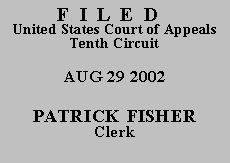

|
UNITED STATES OF AMERICA, |
(D. Kansas)
|
Before KELLY, McKAY, and MURPHY, Circuit Judges.
Hudson pleaded guilty to one count of conspiring to possess over five grams of cocaine base with the intent to distribute. He was sentenced to 108 months' imprisonment. Subsequently, he filed a motion to modify his sentence pursuant to 18 U.S.C. § 3582(c) and Federal Rule of Criminal Procedure 35. The district court denied the motion, determining that § 3582 did not authorize it to modify Hudson's sentence.
18 U.S.C. § 3582(c) provides that a district court may not modify a term of imprisonment once it has been imposed except in three circumstances: (1) upon motion of the Director of the Bureau of Prisons if the court finds that extraordinary and compelling reasons warrant such a reduction or if the defendant is at least 70 years of age; (2) if a modification is expressly permitted by statute or Rule 35; or (3) if the defendant has been sentenced based on a range that has been subsequently lowered by the Sentencing Commission. Hudson contends only that modification is authorized by Rule 35(b).(2)
Rule 35(b) provides that the court may reduce a defendant's sentence to reflect his substantial assistance with law enforcement authorities. Fed. R. Crim. P. 35(b). Importantly, such a reduction may be made only "[i]f the government so moves within one year after the sentence is imposed." Id. The government, however, has made no such motion on Hudson's behalf. Though Hudson's pro se brief is not entirely clear, he seems to argue that Koon v. United States, 518 U.S. 81 (1996), authorizes the district court to modify a sentence pursuant to Rule 35(b) absent a government motion. Koon establishes a framework for analyzing departures at initial sentencing. It does not reference Rule 35 and is not applicable to a motion for modification of a sentence made over two years after sentencing.(3)
The district court is hereby AFFIRMED.
Entered for the Court
Michael R. Murphy
Circuit Judge
*. This order and judgment is not binding precedent, except under the doctrines of law of the case, res judicata and collateral estoppel. The court generally disfavors the citation of orders and judgments; nevertheless, an order and judgment may be cited under the terms and conditions of 10th Cir. R. 36.3.
1. After examining the briefs and appellate record, this panel has determined unanimously that oral argument would not materially assist the determination of this appeal. See Fed. R. App. P. 34(a)(2); 10th Cir. R. 34.1(G). The case is therefore ordered submitted without oral argument.
2. To the extent Hudson argues that the district court may modify his sentence based upon extraordinary family circumstances under 18 U.S.C. § 3582(c)(1)(A)(i), we reject the argument. As the district court noted, § 3582(c)(1)(A)(i) requires that the Director of the Bureau of Prisons make such a motion, not the prisoner. The Director has made no motion in this case.
3. Hudson also cites an opinion from the Court of Appeals for the District of Columbia Circuit, In re Sealed Case (Sentencing Guidelines, Substantial Assistance), 149 F.3d 1198, 1204 (D.C. Cir. 1998), which held that "even where the government files no motion [under U.S.S.G. § 5K1.1], Koon authorizes district courts to depart from the Guidelines based on a defendant's substantial assistance where circumstances take the case out of the relevant guideline heartland." The D.C. Circuit subsequently reheard the case en banc and vacated in part the panel opinion, holding that "a court may depart for substantial assistance only upon filing of an appropriate motion by the government." In re Sealed Case No. 97-3112, 181 F.3d 128, 136 (D.C. Cir. 1999) (en banc). This circuit has adopted the same rule. See United States v. Duncan, 242 F.3d 940, 944 (10th Cir. 2001).